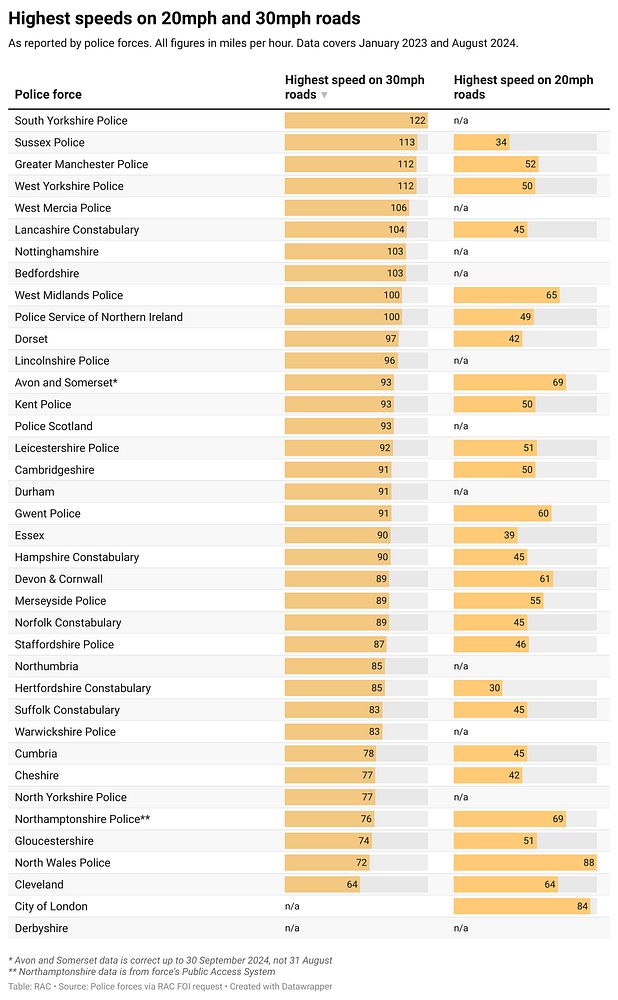Google Street View – Image Date – April 2024
Data shared by the RAC has revealed that West Mercia Police have caught a motorist driving at 106mph in a 30mph zone.
From the RAC:
Almost half of UK police forces (48%) have caught motorists driving over 90mph on 30mph roads – more than three times the speed limit, new data analysed by the RAC reveals.*
A Freedom of Information request to the UK’s 45 police forces also found that, of the 40 with data, almost all (90%) had clocked people driving at 60mph – more than twice the limit – on these roads.
With the highest recorded speed on any road being 167mph on a 70mph stretch of the M1 by Leicestershire Police, the new RAC study paints an alarming picture of the speeds some motorists have been caught driving at. Looking at the largest difference between the speed recorded and the posted limit, the highest logged speed was 161mph on a 50mph eastbound stretch of the A303 in Somerset.
More than half of police forces (23, or 58%) recorded drivers travelling in excess of 140mph. While most of these contraventions were on 70mph motorway stretches, this wasn’t always the case. South Yorkshire Police clocked a driver at 146mph on a 50mph southbound stretch of the M1, while Police Scotland detected someone driving at 148mph on a 60mph section of the A68 in the Scottish Borders.
But perhaps most disturbing of all are the speeds some people are prepared to drive at on 20mph and 30mph roads – those that are far more likely to have high numbers of pedestrians, cyclists and other vulnerable road users using them. South Yorkshire Police recorded a speed of 122mph on a 30mph road, while North Wales Police logged a vehicle being driven at 88mph on a 20mph road. Both speeds are more than four times faster than the speed limits.
In total, six-in-10 police forces (24) have caught motorists driving over twice the speed limit on 20mph roads, with seven recording speeds of more than 60mph.
Government data shows speed is the biggest factor reported in fatal road collisions – it is a factor in 58% of fatalities, and in 43% of road collisions of all severities. In 2023 speed contributed to 888 fatalities, and 39,882 collisions of all severities.**
RAC road safety spokesperson Rod Dennis said: “Although this data is a snapshot, it shines a light on the incredibly dangerous actions of a few, that are putting law-abiding road users at serious risk. Thankfully, the police were on hand to catch these drivers.
“There is no place for the vastly excessive speeds that some people are prepared to drive. While some speeds were recorded in the middle of the night when traffic will have been lighter, this isn’t always the case – some of the fastest drivers were clocked at other times of day when they’d have been sharing the roads with many others.
“Speed is the leading cause of deaths on UK roads. We look forward to the Government’s forthcoming road safety strategy understanding what can be done to reduce such avoidable casualties on the UK’s roads.”
National Police Chiefs’ Council lead for roads policing Chief Constable Jo Shiner said: “We know that some incidents of going over the speed limit can be genuine mistakes or errors but the speeds cited here are clearly drivers taking deliberate decisions to travel at excessive speeds, putting everyone at risk.
“Speed limits are set based on many factors including the road layout, what’s in the surrounding area and taking into account where there might be more vulnerable road users. Choosing to drive above those limits is reckless, selfish and completely unacceptable.
“We all have a responsibility to keep each other safe and do whatever we can to reduce the number of people killed and seriously injured on our roads each day.”
Richard Parker, Mayor of the West Midlands, said: “One life lost on our roads is one too many and that’s why I’m committed to Vision Zero. No more deaths on our roads.
“Too many people are being killed or seriously injured and we need to act now. I’ve launched a Road Safety Action Plan and appointed the UK’s first dedicated road safety commissioner, Mat MacDonald, to make sure communities’ voices are heard and real action is taken to prevent more tragedies on our roads.
“We’re also using cutting-edge AI technology to identify risks and prevent collisions before they happen—another step toward making our roads safer for everyone.”
The RAC’s study on speeding – one of the so-called ‘Fatal Four’ behaviours that cause most fatal collisions on the roads*** – follows its earlier work in January that identified a culture of speeding among some drivers in the UK.
Explore the data: A sortable table showing fastest overall recorded speeds across police forces is available, along with one that shows fastest speeds recorded on 20mph and 30mph roads.


